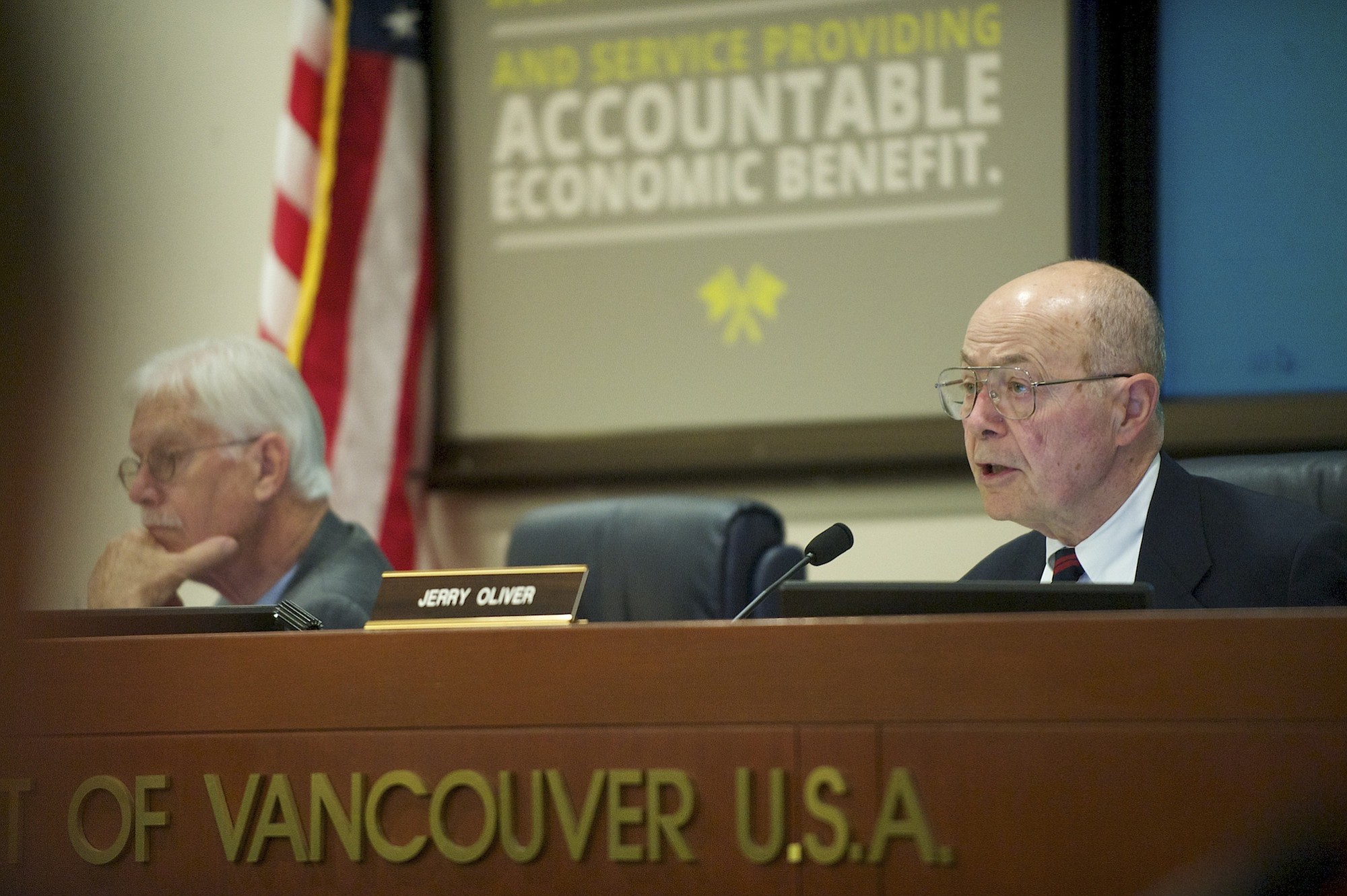After nearly a full week of intense public reaction to a series of newspaper stories critical of the Port of Vancouver’s practices under the state’s open public meetings and records laws, one port commissioner called The Columbian’s investigation a disappointment, while another shrugged it off as a rerun of past articles.
Commissioner Brian Wolfe said Thursday the stories didn’t substantiate the headline, “Port of Secrecy,” and that they amounted to “not very good journalism.” He said he feels like “we’re under attack” but that the phone calls he’s received in reaction to the stories have been positive. “I do try to do the best I can,” he said.
Commissioner Jerry Oliver said of the series this week: “It was basically (a) compilation of everything you printed in the past. I didn’t really see any new information. If there were elements that you thought were new revelations, you could point those out to me. It was all stuff I think I’ve heard before.”
In its first public response to the published series, the port defended its use of executive sessions. Abbi Russell, a spokeswoman for the port, issued the following statement:
“We are confident we’re using executive session appropriately. Our commissioners and staff are committed to transparency, and we take the open public meetings law very seriously. For example, we implemented an Executive Session Reference Guide, which ensures that every executive session is announced with a citation to the specific legal authority for that session. Our legal counsel is also committed to ensuring all rules are followed and that we stay within the specific parameters provided in the RCW. We remain committed to following the letter and spirit of the law, and to doing what’s right for our community.”
The comments came as commissioners Wolfe and Oliver face an effort to recall them from office in the aftermath of The Columbian’s three-part series, which began on Sunday. Their statements join a storm of public comments about the newspaper’s investigation, including dozens of emails and comments on social media. “It’s one of those entities that flies under the radar most of the time,” Jared McClanahan wrote of the port as part of a Facebook post he made on The Columbian’s website. “Hopefully, this excellent piece of journalism, along with recent events, changes that.”
Meanwhile, city of Vancouver leaders on Thursday weighed in, too. Mayor Tim Leavitt said he has “little reason to believe there was any malicious intent” when port commissioners discussed matters in closed-door executive sessions that perhaps should have been talked about publicly. He’s known the commissioners for years and has great respect for them, he said Thursday.
The city opposes a proposal by Tesoro Corp., a petroleum refiner, and Savage Cos., a transportation company, to build what would be the nation’s largest rail-to-marine oil transfer terminal at the port. Parts of The Columbian’s investigation focused on the port’s insular handling of a unanimous decision, in 2013, to approve a lease with the companies for the oil terminal.
Leavitt said he suspects that commissioners are working to rectify any mistakes they may have made regarding compliance with open public meetings laws. “Maybe the most apparent mistake is not contemplating how large of an issue this particular agreement (for the oil terminal) would be in the broader community, with this sort of user and a scale of this nature,” he said.
‘Defer comment’
The Columbian’s three-part series , is based in part on public records, court depositions and interviews with experts in open government. It found a pattern by port leaders of keeping the community in the dark about crucial financial and policy issues before making decisions and of improper use of closed-door executive sessions to hash out safety, environmental and financial issues, among others, meant to be aired in public.
The court depositions taken of Oliver, Wolfe and Commissioner Nancy Baker stem from a lawsuit filed by Columbia Riverkeeper, Sierra Club and Northwest Environmental Defense Center. The suit alleges the port violated the state’s open public meetings law in deciding the oil terminal lease.
In legal filings, the port denies wrongdoing. It also argues it rendered the lawsuit moot by holding a new public meeting on Oct. 22, 2013, before the commissioners revoted unanimously to approve the lease.
Wolfe, first elected in 2005, and Oliver, first elected in 2007, face an effort to recall them from office. Baker is not seeking re-election this year to a third six-year term. The recall petitions were filed by Christopher Clifford, program coordinator for Clark County government’s Environmental Services Department. The petitions accuse the two commissioners of malfeasance, misfeasance and violation of the oath of office, including that they “knowingly violated” Washington’s open public meetings law in discussing in closed-door executive sessions a proposal to build the oil terminal.
In an email to The Columbian, Oliver said Thursday he would “defer comment (on the recall petitions) until the Superior Court has an opportunity to act on this.” Although he hasn’t recently read the court deposition he gave, Wolfe said Thursday he questions the recall petition’s accuracy in attributing certain statements to him. “I have to admit I don’t remember the answers you say I said or the context in which they were asked,” Wolfe said of The Columbian’s use of his deposition in its investigation.
‘Troubles me the most’
Wolfe said the port “can always do better” when it comes to compliance with the state’s open public meetings law. He said one closed-door executive session the port held about the oil terminal — on April 9, 2013 — “troubles me the most.” The stated purpose of that closed-door commission meeting was to discuss a minimum price for selling or leasing land for the oil terminal. Under state law, the port was required to stick to a minimum price discussion. Yet, three Tesoro executives, five Savage executives and BNSF Railway’s general director of industrial products all streamed into the meeting room for a discussion that lasted for about three hours.
Tesoro and Savage executives pitched port commissioners on Tesoro’s “high-performing culture” and “safety and reliability,” Savage’s focus on “giving back to the community,” and a wide range of other topics that filled a 51-page slide presentation.
Wolfe said the evidence The Columbian presented to him, including the slide presentation, suggests that “Tesoro had a long time to convince us that they were the right company to hire for that position.” If a slide presentation was the focus of the meeting, as reported by The Columbian, then “we would have stopped” the closed meeting, Wolfe said.
Now that the port has an executive session reference guide, he said, “I don’t think something like that April 9 meeting would occur again.”
Wolfe said the lease decision was hard on him, as he struggled with two concerns: the environment and economic development. “I was pretty choked up,” he said.
Vancouver City Manager Eric Holmes, who read The Columbian’s series on the port this week, refused to criticize the port for decisions it’s made regarding public process. “I won’t do that any more than I’d expect them to criticize the city,” he said Thursday.
Holmes said the city is committed to having as much open, public, transparent conversation as possible on major policies and major decisions. For example, he said, the city has invited the community to participate on issues such as affordable housing and street funding.
“We strive for high levels of community engagement and high levels of transparency of any significant policy matter that comes before the city council,” he said. Holmes noted that the city’s opposition to the oil terminal project was based on its understanding of the industry and the commodity, not the port’s procedural decisions.
Leavitt said the city is “very particular and very cautious” about what the City Council discusses in executive session. At least one city attorney is present, along with members of senior management, and the council is restricted to talking about labor, legal and real estate issues, he said.
“There’s really no other business of the city that needs to be conducted in a closed session,” Leavitt said.





